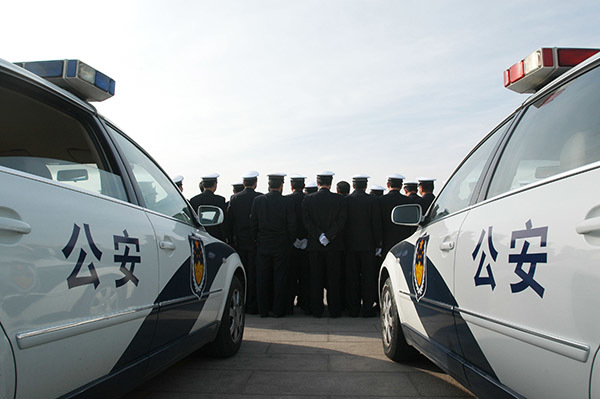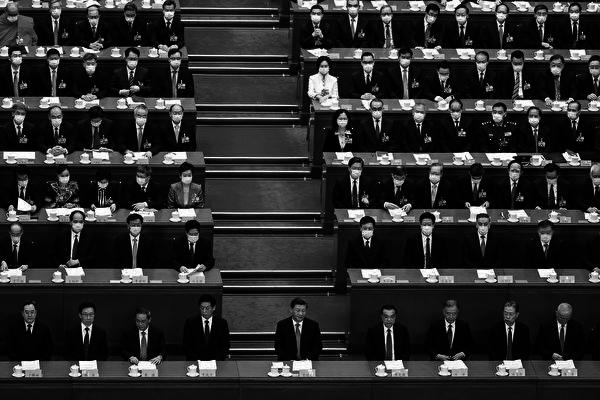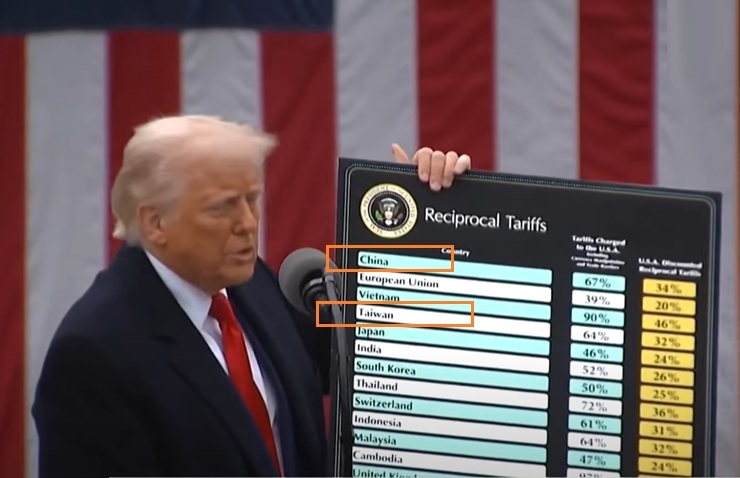A Scene from a CCP Meeting: The Chairperson on Stage Speaks in a Droning Buzz, Perfect for Helping Me Fall Asleep. (Guang Niu/Getty Images)
[People News] An incident in Henan where officials violated regulations by consuming alcohol during a study session on the spirit of the eight-point regulations, resulting in one death, has sparked significant discussion online. The ten officials involved have faced dismissal, expulsion, or demotion. This incident is seen as the first major issue in this year's renewed efforts to enforce the eight-point regulations, raising questions about whether the CCP will initiate a new round of rectification within its ranks.
As reported by Radio Free Asia, the Central Commission for Discipline Inspection (CCDI) and the National Supervisory Commission announced on Tuesday (May 13) that Li Xianlin, the secretary of the Political and Legal Affairs Committee of Luoshan County in Henan, hosted a banquet for at least nine judicial officials from Xinyang City and Luoshan County during the study session on the spirit of the eight-point regulations, one of whom died on the day of the banquet. Five officials who had consumed four bottles of baijiu with the deceased raised funds to compensate the deceased's family and attempted to conceal the circumstances surrounding the incident, while Yu Guofang, the secretary of the Luoshan County Committee, was implicated for failing to report what he knew. The CCDI criticised the involved officials for learning about the eight-point regulations while simultaneously violating them by hosting banquets, demonstrating a blatant disregard for the spirit of these regulations and a lack of respect or fear. They emphasised a policy of zero tolerance and would not overlook such behaviour, with the ten officials facing various penalties including expulsion from the party, dismissal, and demotion. Li Xianlin, who organised the banquet, is also under investigation, and officials from the Xinyang Municipal Party Committee have been disciplined for their inadequate oversight.
Following the announcement of the news, it quickly became a trending topic online, even briefly topping Weibo's hot searches. Some netizens criticised the involved officials for violating regulations during political study sessions, suggesting a disregard for the eight-point regulations within the political sphere. Others questioned why the more serious issues of widespread corruption and officials maintaining mistresses are overlooked, while violations related to drinking are prominently reported by major outlets like CCTV.
The revival of the eight-point regulations rectification movement aims to purge discontented local officials within the party.
Senior political and economic commentator Cai Shenkun (蔡慎坤) remarked that the local officials involved have become the centre of media attention, which he views as a manipulation of public opinion by the authorities, designed to align with the spirit of the eight-point regulations learning initiative launched this year. He indicated that this learning movement is spearheaded by Politburo Standing Committee members Cai Qi (蔡奇) and Li Xi (李希), and is likely intended to prepare for an important political meeting scheduled for later, aimed at addressing discontent within the party.
Cai Shenkun stated: "The upcoming Fourth Plenary Session will focus on personnel arrangements. Just two days after the conclusion of the Two Sessions, the education activities regarding the eight-point regulations for the entire party began, running from March to July, with inspection teams sent to various localities. It is evident that this is a concerted movement. Xi Jinping's team is addressing various forms of discontent and criticisms within the party, especially since many rumours circulating abroad originate from within the party itself. Particularly at the dining tables of CCP officials, it is common to hear grievances expressed. This time, the primary objective is to purge officials from various localities who do not align with Xi Jinping, aiming for a significant cleansing."
Cai Shenkun remarked that this incident illustrates that punishing violations related to eating and drinking is merely a superficial reason. The real issue lies in the fact that violations of the eight regulations reflect disloyalty, particularly when officials are learning about them. However, local officials have limited power and find it challenging to use the crackdown on major corruption as a pretext for punishment; thus, violations of the eight regulations become the most convenient tool for rectification.
Cai Shenkun further stated, 'After over a decade of Xi Jinping's leadership, most of the major corrupt officials have already been dealt with. Now, we can only target these minor officials, particularly those who show little interest in learning from and being loyal to Xi Jinping. Within this system, there remains a significant number of individuals without power, whom he (Xi Jinping) does not favour. Currently, the eight regulations are being reintroduced to address the situation, specifically aimed at officials who have not committed serious corruption. For example, I know of an official who, when his corruption was not uncovered, was instead penalised for violating the eight regulations, being accused of spending at least 8,000 yuan on a meal, which was deemed excessive hospitality, resulting in a serious warning from the party.'
The eight regulations not only serve as a tool for rectifying the officialdom but have also become a means for power struggles among officials.
Professor Feng Chongyi from the University of Technology Sydney in Australia pointed out that the primary role of the eight regulations is to ensure party cadres' loyalty to Xi Jinping, providing political tools for the party's leadership to reform the officialdom. He also noted that the current social conditions in China are poor, and it is normal for officials to feel dissatisfied with the status quo. The eight regulations have turned into a tool for selective enforcement against these officials, instilling fear in them about speaking out against the central government. Additionally, the eight regulations can be exploited by officials as a means for mutual denunciation and political infighting.
Feng Chongyi remarked, "The Eight Regulations serve as a party discipline, characterised by their strictness and vagueness, allowing them to be wielded as a political tool at any moment. On one hand, during political campaigns, they can enhance the rectification of officials, ensuring that they are more compliant and obedient. On the other hand, they can be used as instruments in power struggles among officials. For instance, some government officials may actively invoke certain regulations to safeguard themselves or to achieve political results, thus turning the Eight Regulations into a political tool."
Senior commentator Hu Ping noted that after the Eight Regulations were introduced in 2012, they initially functioned as a means to intimidate officials. However, due to their excessively stringent nature, they cannot and should not be enforced over the long term. The leadership tends to enforce them strictly only when politically necessary.
Hu Ping explained, "The Communist Party aims to uphold its image, but it (the Communist Party) is also aware that some of these demands are impractical. Therefore, they often choose to overlook them. They understand that this screw is generally quite loose, and periodically, they will highlight a typical case to tighten it a bit, and then tighten it again after some time. This approach helps maintain the party's image while preventing officials from becoming overly excessive and arrogant."
Hu Ping further indicated that when instances of punishment for breaching the Eight Regulations come to light, local officials will become more cautious. During the phase of reintroducing the spirit of the Eight Regulations for educational purposes, they will likely curb behaviours such as using public funds for dining and entertainment. However, once the movement concludes, these behaviours are expected to resurface.










News magazine bootstrap themes!
I like this themes, fast loading and look profesional
Thank you Carlos!
You're welcome!
Please support me with give positive rating!
Yes Sure!